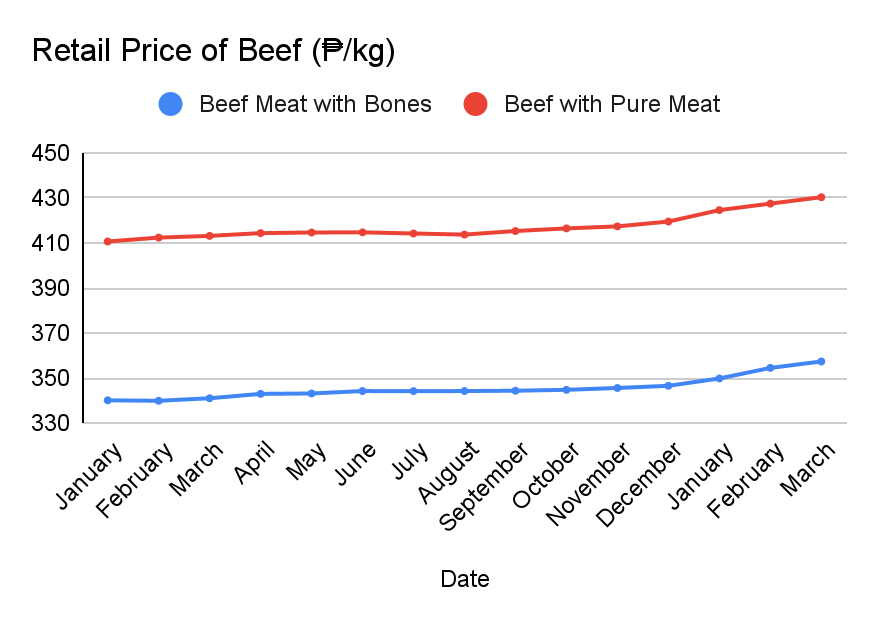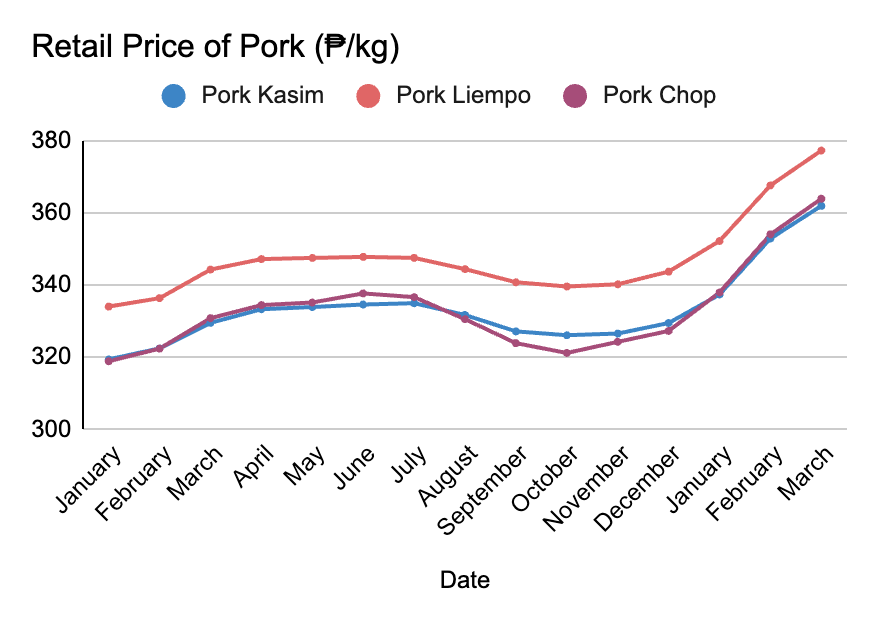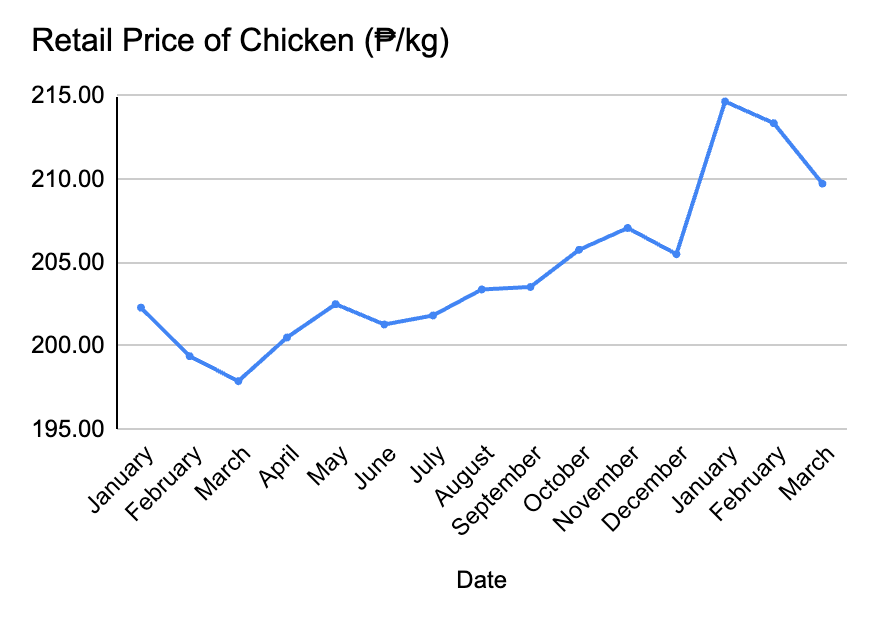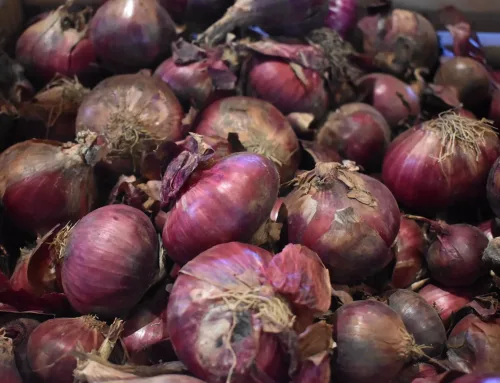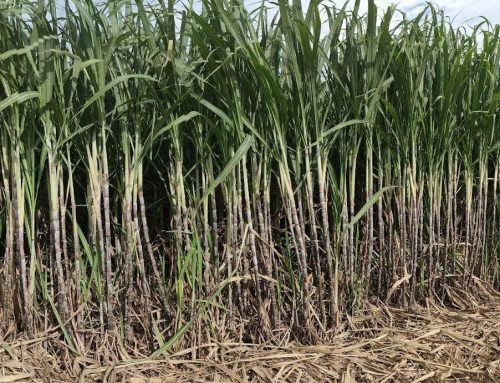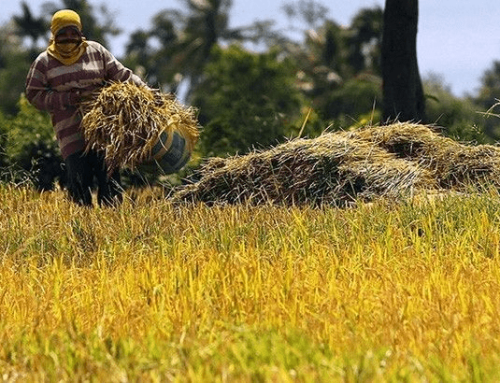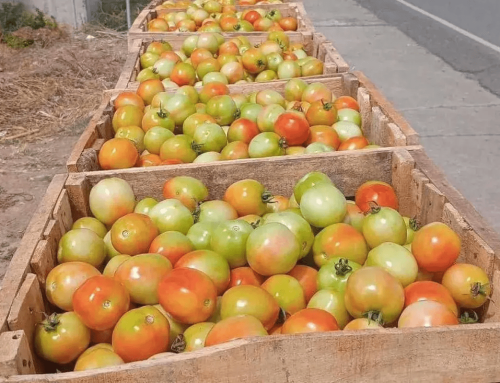In this Article
The Philippine government has intensified efforts to protect the country’s livestock and poultry industries through strengthened disease control programs, new import regulations, and the establishment of an animal vaccine center in Nueva Ecija. This advisory highlights recent developments in animal health, examines current meat price trends, and discusses their potential implications for producers and consumers.
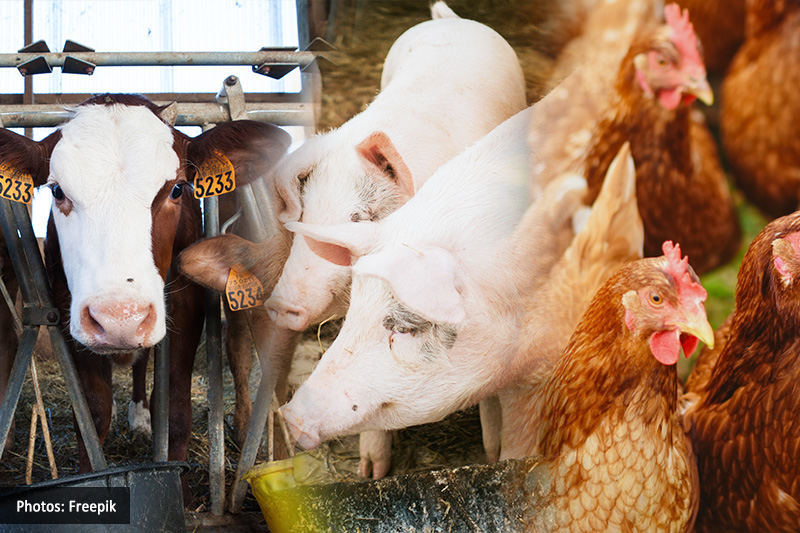
Source: PIDS
Rising Meat Prices and Factors Influencing Price Movements
Recent data from the Philippine Statistics Authority (PSA) reveals a sharp rise in meat and poultry product prices as of March 2025 (Figure 1). Retail prices for livestock and poultry products have shown an upward trend from January 2024 to March 2025, with a noticeable surge starting in December 2024. Pork cuts—particularly pork chop, kasim, and liempo— recorded the steepest increases, with price jumps ranging from 9.58% to 10.01% compared to the previous year (Table 1). Beef prices rose moderately, while chicken prices remained relatively stable until early 2025 when they experienced a slight uptick.
Figure 1. Retail Price Trend Beef and Pork, 2024-2025
Source: OpenSTAT, 2025
Table 1. Annual Retail Prices of Livestock and Poultry, March, 2024-2025
|
Item |
March 2024
(₱/kg) |
March 2025
(₱/kg) |
Percentage Increase (%) |
| Beef Meat with Bones |
341.17 |
357.48 |
4.78% |
| Beef with Pure Meat |
413.16 |
430.30 |
4.15% |
| Pork Kasim |
329.52 |
361.97 |
9.85% |
| Pork Liempo |
344.29 |
377.29 |
9.58% |
| Pork Chop |
330.82 |
363.94 |
10.01% |
| Chicken Whole |
197.89 |
209.74 |
5.98% |
Retail prices of meat and poultry products recorded in March 2025 at the Batong Malake Public Market in Los Baños, Laguna (validation market) reflected the national trend, particularly highlighting price increases in pork products. Pork liempo recorded the highest average retail price at approximately ₱430/kg, followed by pork kasim at ₱400/kg. Whole chicken retailed at ₱240/kg, while beef brisket averaged ₱320/kg.
Several factors contribute to these trends. Locally, African Swine Fever (ASF) continues to disrupt domestic supply and drive prices upward. Internationally, pork prices surged following Germany’s regaining of foot-and-mouth-disease-free status, which prompted major partners like the United Kingdom and the Philippines to lift importing bans. Strong global demand has further driven prices higher. Global beef markets have also seen limited supply and strong demand, mirroring the moderate price increases in local beef cuts. Poultry prices have remained more stable, although avian influenza may cause shifts in the coming months. These trends highlight the interconnectedness of domestic supply conditions and international market movements in shaping retail meat prices in the Philippines.
Government Initiatives
Government intervention is essential in helping stabilize the market for livestock and poultry products, especially given the effects of the supply of meat, which results in price increases. The government has launched several important initiatives:
Strengthening Disease Surveillance
To contribute to the development and sustainability of the livestock and poultry industry, the Department of Science and Technology – Philippine Council for Agriculture, Aquatic and Natural Resources Research and Development (DOST-PCAARRD) funded a project to commercialize locally-produced rapid test kits for transboundary animal diseases, supporting early detection and improved disease management in the livestock sector. Implemented by the Blitzkrieg Animal Diagnostic Center, a spin-off company of the Central Luzon State University (CLSU) and led by Dr. Clarissa Domingo, the project concluded in April 2024, focusing on the promotion of the Andali LAMP Kit for the Swine Porcine Epidemic Diarrhea (PED) virus, delivering diagnostic services, recruiting distributors, and producing an infomercial campaign to raise awareness.
By bridging local innovation with commercialization, the project enhances the country’s animal health infrastructure and contributes to more resilient livestock systems. As disease outbreaks threaten the swine industry, accessible and accurate rapid testing solutions safeguard farmers’ income, sustain production, and ensure a stable meat supply in local markets.
In a separate initiative, DOST, in partnership with the Ministry of Science and Technology (MOST) of the People’s Republic of China, funded a project to strengthen the resilience of the local poultry industry and reduce the impact of avian disease outbreaks on market stability. The project was implemented by the Bureau of Animal Industry (BAI) to detect and characterize circulating strains of Avian Influenza (AI) and Newcastle Disease (ND) through Reverse Transcription Polymerase Chain Reaction (RT-PCR) and virus isolation while identifying outbreak hotspots, analyzing risk factors, and building a genomic database of local strains.
The initiative, which concluded in April 2024, enhanced local capacity by training livestock inspectors and laboratory personnel and fostered partnerships with China’s Jilin University. The project supports long-term biosecurity efforts by providing a strong scientific basis for disease surveillance and response. As global poultry trade remains volatile due to recurring outbreaks, the project plays a key role in protecting domestic supply chains and maintaining the availability of affordable poultry products in local markets.
Tightening Import Regulations to Protect Local Industries
To control external threats, the government also implemented strict import measures in response to global disease outbreaks. The Department of Agriculture (DA) has enforced several temporary bans to prevent the entry of infected animals and products. In early 2025, the agency suspended poultry imports from Belgium and France following confirmed Highly Pathogenic Avian Influenza (HPAI) H5N1 cases. Similar protective bans were imposed on poultry imports from Japan and Austria in late 2024. Import restrictions were also applied to the U.S. states of Indiana, New York, and Pennsylvania in March 2025, all due to HPAI outbreaks.
Following the confirmed outbreaks of foot-and-mouth disease (FMD), the DA has imposed import bans on animal products from Germany, South Korea, Hungary, and Slovakia. These bans cover live swine, cattle, water buffaloes, and products like meat, semen, and tallow, with exceptions for UHT milk, heat-treated meat, and processed products. The Philippines retains its official FMD-free status as recognized by the World Organization for Animal Health (WOAH). Implementing these preventive import bans will preserve the country’s FMD-free accreditation. FMD does not pose a significant food safety risk to humans, as the virus is eliminated through proper cooking and pasteurization.
While these measures are essential for disease prevention, they may tighten the supply of imported products, possibly leading to higher beef, pork, and dairy prices. Consumers could face slightly more expensive meat and dairy items, while local farmers may benefit from stronger demand and better farmgate prices. However, higher costs for breeding materials and inputs could affect production expenses. Maintaining the country’s FMD-free status remains crucial for ensuring long-term market stability, protecting livelihoods, and supporting trade opportunities.
Advancing Local Vaccine Development
ASF remains a major concern for the local swine industry, with its impact still being felt by consumers due to the continued shortage of pork supply in the market. In response, the DA is reinforcing disease control protocols and surveillance systems. Although the Philippines has maintained its FMD-free status without vaccination since 2011, the global resurgence of FMD, including recent outbreaks in Slovakia and Germany, has prompted the government to strengthen its safeguards.
To build long-term resilience against transboundary animal diseases, the DA officially inaugurated the Center for Transboundary Animal Diseases (CenTrAD) at the Central Luzon State University (CLSU), Muñoz, Nueva Ecija, on April 9, 2025. The center will focus on the local development of vaccines for ASF, avian influenza, and FMD. Agriculture Secretary Francisco Tiu Laurel Jr. emphasized that this initiative is a key component of the country’s food security strategy, with ₱151 million in funding under the National Livestock Program to support vaccine R&D and reduce dependence on costly imports.
Market Outlook and Implications
Meat prices are expected to remain high due to ongoing supply constraints and strong global demand. Pork prices will likely stay the most affected due to the lingering effects of ASF, while beef prices could rise moderately amid global market pressures. Though relatively stable in recent months, poultry prices may rise with recent import bans related to avian influenza. In addition, FMD-related bans on imports from affected countries are necessary for disease prevention but could further tighten beef, pork, and dairy supplies.
For consumers, higher meat prices may strain household budgets and shift consumption toward more affordable proteins like chicken, eggs, or processed products. For farmers, higher farmgate prices offer income opportunities but are offset by rising production costs and limited access to veterinary services, particularly for smallholders. Government investments in vaccine development and preventive disease control measures, alongside maintaining the country’s FMD-free status recognized by WOAH, are crucial to stabilizing the meat supply chain, supporting rural livelihoods, and ensuring affordable market prices.
References:
BusinessMirror. (2025, April 9). Meat prices more expensive in March – report. BusinessMirror. Retrieved April 9, 2025 from https://businessmirror.com.ph/2025/04/09/meat-prices-more-expensive-in-march-report/
DA Press Office. (2025, February 25). DA imposes temporary import ban on animal products from Germany. Department of Agriculture Press. Retrieved April 9, 2025 from https://www.da.gov.ph/da-imposes-temporary-import-ban-on-animal-products-from-germany/
Enriquez, E. (2025, April 9). DA opens vaccine development facility in Nueva Ecija. Manila Bulletin. Retrieved April 9, 2025 from https://mb.com.ph/2025/4/9/da-opens-vaccine-development-facility-in-nueva-ecija
FMD Info. (n.d.) Consumer Safety. FMD Info. Retrieved April 23, 2025 from https://www.fmdinfo.org/consumer-impacts/consumer-safety?utm_source
German Federal Institute for Risk Assessment. (2025, January 10). Foot-and-mouth disease in cloven-hoofed animals: No hazard to humans through food consumption. BfR – Identifying Risk Protecting Health Communication 001/2025. Retrieved April 23, 2025 from https://www.bfr.bund.de/cm/349/foot-and-mouth-disease-in-cloven-hoofed-animals-no-hazard-to-humans-through-food-consumption.pdf?utm_source
Lagare, J.B. (2025, April 9). Animal vax development center unveiled in Nueva Ecija. Philippine Daily Inquirer. Retrieved April 9, 2025 from https://newsinfo.inquirer.net/2051489/animal-vax-development-center-unveiled-in-nueva-ecija
Lopez, J. M. (2025, April 8). DA sets ban on poultry, wild birds from Belgium. The Manila Times. Retrieved April 8, 2025 from https://www.manilatimes.net/2025/04/08/business/top-business/da-sets-ban-on-poultry-wild-birds-from-belgium/2087802
Macapagal, J. (2025, April 8). DA temporarily bans poultry imports from Belgium. Malaya Business Insights. Retrieved April 8, 2025 from https://malaya.com.ph/business/corporate/da-temporarily-bans-poultry-imports-from-belgium/
Macapagal, J. (2025, April 9). DA launches animal vaccine unit in Nueva Ecija. Malaya Business Insights. Retrieved April 9, 2025 from https://malaya.com.ph/business/corporate/da-launches-animal-vaccine-unit-in-necija/
Pelonia, A. (2025, April 9). PHL kicks off efforts to develop vaccine against ASF. BusinessMirror. Retrieved April 9, 2025 from https://businessmirror.com.ph/2025/04/09/phl-kicks-off-efforts-to-develop-vaccine-against-asf/
Jose, K. (2025, April 9). Importasyon ng animals, animal products mula Slovakia ipinagbawal ng Pinas dahil sa FMD. Remate Online. Retrieved April 9, 2025 from https://remate.ph/importasyon-ng-animals-animal-products-mula-slovakia-ipinagbawal-ng-pinas-dahil-sa-fmd/

